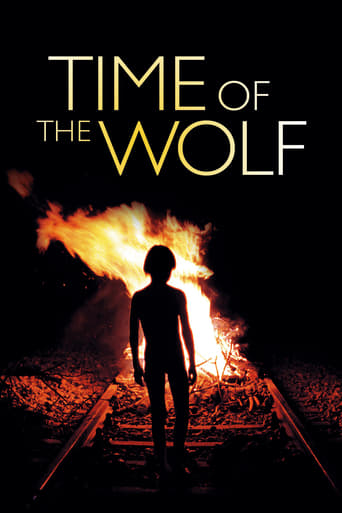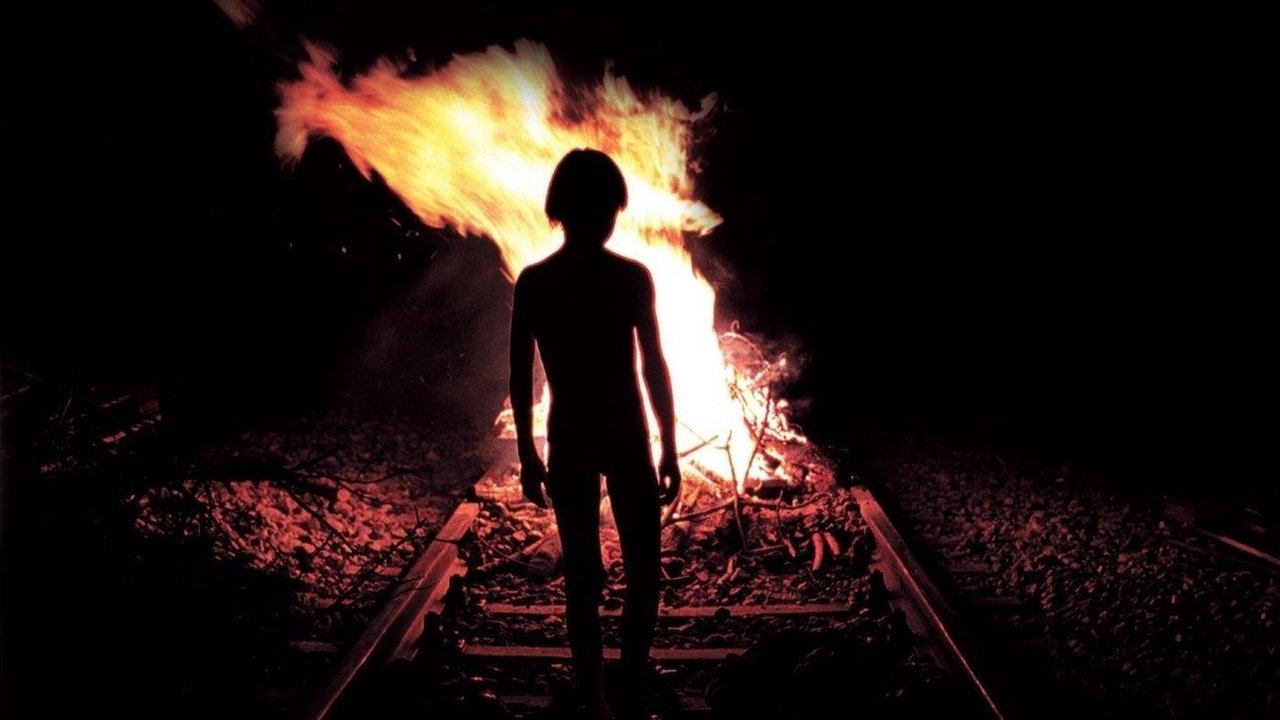Jacob Miller-alderman
Many times, I will detract from a film for lacking a real ending or beginning, because it causes some incoherency in the story (not to mention it is sort of a let down), but when I sat down to watch "Time of the Wolf" I was fairly surprised on its ability to just pick up on a story and keep the momentum going without having to explain much at all.The name of the game here is subtlety, which is something Michael Haneke understands completely. His use of dialogue and atmosphere tells you whats going on without really saying outright: The world is ending. this is where the film really shines. There isn't much messing around either, strange happens are very apparent early on and seem to keep going until there very end.When I first heard it was apocalyptic setting, it crossed me as fairly peculiar. Michael Haneke's films, though being sort of surreal at moments, never really dip into the world of fantasy. I was really confused on how a man of his style was going to pull off a theme that was used primarily with big budgets and big special effects. Lo and behold, he pulls it off without a problem. The trick is as old as movies them selves; its not what we see, but what we don't that creates the story. We hear plenty from the different characters, but it is up to us to paint the picture in our head. A sort of practice that has been forgotten in the world of CGI.Speaking of characters, this film has plenty but don't spend time trying to get to know them. The only characters that you get to see develop is that of the main characters; a mother and her two kids. This lack of strong character structure creates a sort of realism to the film. I don't suspect myself to become acquainted to many folks during the apocalypse and for very good reason. As this movie shows, most of the people that will surround you in the end of days are either thieves, killers, or both and trust is not a luxury one can afford.Not Haneke's most gripping tale or most violent, but definitely one that deserves a good watch.
lastliberal
I would have to say that you either like Michael Haneke (The White Ribbon, Funny Games, Cache) or you don't. His films are dark and depressing, raw and emotional, and, many times, they leave you clueless as to what is going on. Yes, they are cerebral, and a welcome change from the mindless movies with frat boys and fart jokes.Any chance to see Isabelle Huppert (8 Women, The Piano Player) is a good thing.It is a post apocalyptic world. We never really know why. Maybe a virus of some sort. It is a chance to think about how people will act when there is not law, and how they will cling to the slightest hope for survival. Again, Haneke provides the framework and lets us make up our own minds about how it ends.
amazing_sincodek
Of the Haneke films I've seen, this is the only one that didn't absolutely blow my mind. Funny Games is my all time favorite film, and The Piano Teacher is in the same league. Time of the Wolf (TotW) is stylistically recognizable as Haneke's work, and is certainly a well-made film. Unlike his other films, however, it contains nothing the veteran viewer hasn't seen (a dozen times) before.TotW is a post-apocalyptic drama. The cause of the apocalypse is ambiguous; the focus is on human behavior under stress, and in the absence of authority. The style of the film is appropriately very bleak and dry. Though there are occasional dramatic events, they certainly do not feel like action scenes. Rather, the whole thing deliberately has a very "tired" feel to it. Most of the characters are very convincing, and the film's greatest strength is the horror it creates in showing normal people break under the stress.A difficulty with making a post-apocalyptic story is that there are only so many things one can do with it. If you've read "The Road," you've essentially seen TotW. If you can imagine 28 Days Later with more subtlety and no zombies, you can imagine TotW; some components of the endings are nearly identical. I personally feel that Haneke's directing talents were wasted with this one, because it's such a tired old story that the slow pace and subtlety just makes it tedious--to the veteran viewer, there's no magic, no mystery; just repetition.
jse126
Really. It is not a film. It is an experience. And I do not mean that it is an experience in a Disney-fueled idiot fest where Spielberg pushes emotional buttons to get predetermined responses way. I mean that it is a true experience, and I can honestly tell you that I have never felt this as strongly in any film that I've ever seen.I saw this film in the best way possible, in that I had never heard of the movie beforehand. I only knew that it was French and post -apocalyptic, and having had good luck with my last French post-apocalyptic film "Delicatessen," I hit the play button and looked at the screen. This proved to be very beneficial. If you are reading this then you probably did not have the exact same experience - but while a bonus in my opinion, it is not necessary and usually not possible anyway.So - the experience. What does that mean? The film opens with the most subdued credits possible. Completely silent and barely legible for the small font. Then the film opens, and the one cleverly placed automobile that we will see reveals that the time period is the present, without anything else being referenced to time frame for the rest of the film. Nothing seems amiss, but within five minutes we know that something is very wrong. It turns out to be a post-apocalypse of some sort, but we do not know what type of apocalypse it was, when it happened, how widespread it was, or much of anything else about it. We can only assume that it was not nuclear because there are no references to any type of sickness. It is rather odd because we do not see much, if any, evidence of property damage. But whatever it was, people were getting down to the bare essentials of what it means to be a human being and it did not seem like much time had gone by since the event occurred, so it must have been pretty bad. Not only does it seem to be a relatively recent event, but there is no evidence whatsoever that the event was any more widespread than a hundred miles or so. And we don't know how much the people who survived know either - for all we and they know, the world outside of their general area is fine.We are dropped into this situation and left to figure it out. This is where the film starts to become an experience. Other than knowing exactly what the apocalypse was, we are on equal footing with the people in the film and as they go, we go. This has to be the most realistically human film that I have ever seen. What I mean by that is that there seemed to be no actors, no actresses, no directors, nothing but life that we are part of. Nobody stood out as a "better" actor than the others - it was not even possible. The audience is as much a part of the film as anyone in it - and most importantly there are no plot tricks and devices; no emotional button pushing; no special effects; no tricks at all. Everything that you find in this film will be gleaned as in real life and just as the people in the story glean it. The only type of device whatsoever was that a couple of scenes ran extra long; but just long enough to get you feeling whatever it is that you would feel in such a situation in reality. They are very effective - and they tell you absolutely nothing. But just as in reality, where scenes don't change by the minute and things are not always explained, you have time to sit there and just look and think, or wander off, or whatever you would do - but it is real. They're too long for 99.9% of the American audience I'm sure. I will say that many things, such as that automobile, seemed expertly placed and calculated - but they never came off as manipulative. They were simply ways of illustrating something with a picture instead of a thousand words.Just as in the beginning when the film drops you into a situation that you must join into and glean information from what your eyes can see and your ears can hear, it leaves you the same way when it ends. Actually, this film really has no beginning or ending - it's simply a chunk of time that we become part of. The ending credits are just as subdued as the starting ones were, and I get the feeling that the filmmakers would have preferred to have no credits whatsoever. Just start and stop. I suppose that that's not allowed though. Even French cinema needs to pay its bills.This is an incredibly hard film to assign a numbered rating to, but in the end I can give it nothing but a ten. Having said that, I can tell you assuredly that I will never watch this film again. Although huge in its bleakness it did not depress; on the other hand watching it again would be like taking a very bad part of my life and living it over. This is probably the only film that I have ever seen that has not one tiny speck of humor or even levity in it. Not one. It makes the most dour Bergman film look like a bit lighthearted, and I am not saying that to be funny or "witty." I really mean it. The sad part about that is that at its core this movie is about us all. It is about human beings, and it challenges all but the most casual of viewers to make some difficult predictions about what they might do in such a situation. And I hope that we would do a -little bit- better than most of the people here did.


 AD
AD





